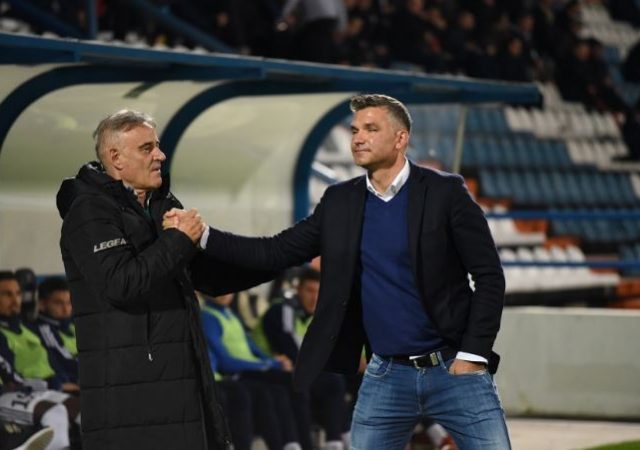
Coaches say hello to eachother, right?
The cover photo, which shows us the greeting of two Croatian professional coaches, motivated me to write today’s text. Do you notice what’s unusual in the photo? Take a little better look. The coach on the right holds his hand in his pocket while shaking his colleagues hands, his eyes focused on the opposite direction to the one of his colleague. I have to admit that I was surprised to notice that obviously the PRO licensed coach failed to master the basic communication skills during school. Especially since CFF Football Academy does a great job in training coaches, and there is also a subject in communication science?
This photo has been posted publicly. So far, tens of thousands of people have seen it. Most of them have never, and probably will never have the opportunity to meet this coach personally, so the image of his coaching profile will be created on an impression. The image of a coach welcoming a colleague in that way will certainly not be positive in the eyes of a football match attendee.
In order to become a successful coach in sports, it is necessary to constantly acquire various knowledge and skills. Among others, the generally accepted postulates of a behavioral culture. Culture determines the value system, establishes norms and shapes the coach’s awareness and behavior. It directs the trainer’s actions and defines his / her worldview. Although culture is often perceived by humans as something that is given to us by birth, it is a socially conditioned and shaped form that has been gradually adopted over the years by its predecessors.
This photography also raises suspicion that non-verbal communication is probably not his only communication problem. The way a coach communicates on the field tells us a lot about him. How successful he is, how productive and content he is in the sports environment in which he operates. I would be interested to see how he communicates with the players. I hope he will find out about this article. Perhaps he would be encouraged to realize the importance of knowing communication skills. It’s never too late to make changes for the better, the hardest thing is to recognize their potential.
The coaching profession is no longer solely related to the field and the individual or team. Today, in addition to having to know how to communicate with colleagues, referees, parents, management, the coach must also show the players by his example how to manage, look and present themselves to the environment. An example of a coach’s behavior from a photo is certainly not a good one, but that doesn’t mean he can’t change for the better. Knowledge of communication skills is a safe haven for any coach. The mere fact that someone is a good coach today is no longer a guarantee of his success.
The end of the year means also the beginning of the next year, and now I will pause for a little while (as I suggest to you), devote myself to my family and think about what the year that has come to an end teached me. It makes me happy if my articles have made even a small contribution to your coaching progress. Thank you for reading my blog throuhout the year and I hope you’ll read it again next year. For you, who are a little more interested in the topics I address, one more small piece of information: my new book, “Great Coaching And Your Bottom Line: How Good Coaching Leads To Superior Business Performance”, is out there. You can buy it by clicking on:
or
I wish you a positive and sports successful 2020 year!
